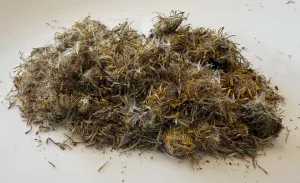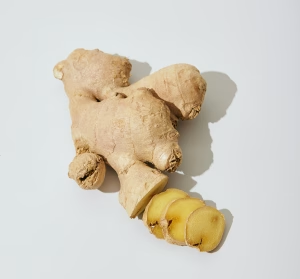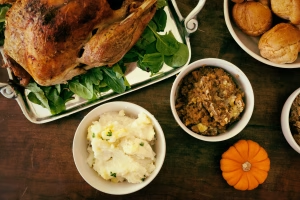Digestive Disorders
Herbal Profile: British Yellowhead
 Meet “Xuan Fu Hua,” or the British Yellowhead flower, an herb commonly used to treat acid reflux, cough, or allergies, outlined in the Divine Farmer’s Materia Medica as “salty, warm, and slightly toxic,” originally indicated for fullness below the rib sides and fright palpitations.
Meet “Xuan Fu Hua,” or the British Yellowhead flower, an herb commonly used to treat acid reflux, cough, or allergies, outlined in the Divine Farmer’s Materia Medica as “salty, warm, and slightly toxic,” originally indicated for fullness below the rib sides and fright palpitations.
Why? How does the Yellowhead flower achieve this?
Salty flavors and their chemistry have a descending action in the body—one that revolves around the manipulation and distribution of fluids—that is so pathogenic fluids can be purged, allowing for healthy fluids to be re-directed, steamed upwards where they belong.
When the heart lacks blood it is more susceptible to fright and palpitations (it isn’t only your anxiety). When the neuromuscular vessels that traverse the ribs lack fluids, we feel pain or tightness. And in many cases of acid reflux the root of the problem is not an abundance of acid, but a lack of fluids and/or electrolytes around our metabolic organs.
Yellowhead flower is not always the magic bullet for all these conditions; but when their root cause is one of gases and fluids in the body failing to descend, perpetuating a vicious cycle that is due to a void of fluids below in the first place, its formulas are a primary route we’ll hope and suspect to be effective. The opposite physiological patterns of GERD will instead be aggravated, because holistic medicine.
The chemical composition of Yellowhead flower includes quercetin, which comes from the white part of grapefruits and oranges and is often sold as a supplement to treat seasonal allergies; caffeic acid, a polyphenol found in coffee beans; and chlorogenic acid, an antioxidant that is also found in coffee beans. This makes sense as the diuretic effect of coffee is obviously a downward one in the body that subsequently lifts functional chemicals upward in turn.
Acid Reflux

There is a concept in Chinese medicine called “Counterflow qi,” which is in reference to when bodily gases or fluids move in the opposite direction from how they are intended. In the digestive process everything is supposed to move down. Don’t get me wrong—not too quickly—but down nonetheless. Any symptom of movement to the contrary is evidence of metabolic dysfunction.
Belching and burping are generally not perturbing to most of their sufferers, possibly apart from the occasional social embarrassment for loved ones. Nevertheless, they are indicative of some degree of weakness and/or inadequacy of vital substances failing to fully process something in the gut.
Vomiting is the extreme version of this, but the principle is the same. Somewhere in between is acid reflux, or “GERD” (gastro-espophageal reflux disease), which usually manifests as symptoms ranging from a burning sensation in the gut, chest, or throat, to a trapped feeling “below the heart,” as Classical Chinese texts would say. Patients experience this anywhere from once or a few times a week if they “eat something wrong,” to incessantly in every waking moment, understandably prompting them to somehow medicate, one way or another.
What causes this? Frankly, metabolic weakness and/or a lack of functional organ fluids, both of which can be caused by all the usual suspects: poor diet, stress, genetic predispositions, and long-term use of pharmaceutical medications.
Ironically, the drugs most commonly prescribed by conventional medicine for GERD, proton pump inhibitors, work by blocking stomach acid, thereby causing more physiological dryness, aggravating the root cause of the condition while muting its branch. This might be okay for a little while for those suffering from “excess patterns,” where the GERD truly is caused by excessive acid—but for those whose symptoms are due more to weakness, such medications will most likely yield a short leash.
Chinese medicine first attempts to distinguish the pattern—which kind of reflux are you? Then we treat accordingly, using acupuncture points and herbal formulas to calm the metabolic organs by imbuing them with more strength, mucosal fluids, and blood, and over time proper directionality of gases and fluids should follow suit.
In the meantime, it is advisable to eat foods that are easy to digest, such as sweet potatoes, steamed vegetables, eggs, fish, tofu, white rice, and/or pasta. Obviously, avoid as much as possible spicy foods and alcohol, refined sugar, dairy, and raw, uncooked foods. (Deep) breathing can be helpful for its inherent function to descend, as can massaging the stomach with both palms of your hands in 36 clockwise circles around the belly button. Empirical symptom management en route to unearthing the root cause of your unique pattern include DGL licorice pills if your pattern is one of weakness, or mint tea if you produce too much acid.
Black Friday & Raw Ginger

Friendly reminders for the next cold month of holiday season: To ward off cold weather most of the body’s excitatory and invigorating substances rush to the surface, thereby leaving our metabolic and endocrinological layer more vulnerable to cold and/or hypo-functionality. This can be the case even in places like Los Angeles, where the climate is relatively colder than what its inhabitants are used to.
A daily cup of ginger can warm our “more internal parts,” as to do with organs and hormones. I would recommend 3 slices, as depicted here, simmered in 3-4 cups of water for 30-40 minutes. If you’re dealing with sinus and/or respiratory issues you can use 4-5 slices, which changes the chemistry of the ginger to act more upon the lungs. If your physiological pattern includes “blood deficiency,” it is advisable to combine with a teaspoon or tablespoon of honey, or a few red dates, so as to not aggravate dryness.
Little known facts about raw ginger:
- can raise blood pressure and heart rate
- Increases stomach motility and acid secretion
- Evidenced to have an antibiotic effect against Salmonella typhi (Typhoid fever), Vibrio cholerae (Cholera), and Trichomanas vaginalis (an STD). Obviously, consult your physician. If used in such cases it should be within the context of a greater, targeted, customized formula
Second and final reminder: BLACK FRIDAY!
$50 OFF all follow up sessions and $100 off initial visits between now and New Year’s. Exclusions include those with 10 discounted session packages, those receiving superbills, and of course insurance patients.
Mitigating the Side Effects Of Holiday Indulging

As all of our stomachs, intestines, livers, and pancreases quiver in fear, anticipating the overindulgences to come in the next six weeks, there are steps we can take to mitigate their onslaught of abuse, first and foremost of which is to potentially be mindful to not over-abuse—an unrealistic request for enough of us! So, what OTHER MEASURES can we take?
- Strength training: By making good use of the excess proteins and calories we can getbigger and badder musculature, and since the muscles draw upon the pancreas and stomach for tonification, strength-training provides the additional benefit of putting less burden on these organs, enabling them to better deal with the burden of parties.
- Hot tea: Booze if you must leading up to, during, and even after the meal, but bookmark your gluttony with hot tea—either Pu-Erh, which contains naturally occurring pro-biotics, or whichever flavor floats the boat. Hot tea will dilate and relax the blood vessels of your enteric nervous system (belly) which aids in digestion by breaking down the inevitable accumulations of gravy, yams, and butter.
- Breakfast! Some people make the mistake of skipping breakfast (or even lunch) the morning of Thanksgiving to “make room” for the feast to come. This is an error, as skipping breakfast actually sacrifices some of the gut’s enzymes and beneficial acids, which can make digesting the feast more difficult. Fine if you want to go small, but have something, preferably, oatmeal, millet congee, or eggs and vegetables.
- Stress management: The holidays bring at least one challenging individual into our homes, so in the words of my daughter’s favorite song: “Let it go.” Ignore if possible, just for the day, and re-address if you must the next time you speak to them.
- CHINESE HERBS! Last but not least, YOU GUESSED IT! Commonly used ingredients include hawthorn berry, which can lower cholestrol, magnolia bark if you’re the type who feels gassy and stuffiness in the chest, tangerine peel if you feel too low on appetite to get properly gluttonous, obviously ginger and licorice, the latter if you tend to GERD, also barley sprouts or medicated leaven, which are great for food stagnation.
If you’d like a brief consultation to determine what is the best gluttony-support formulation for your body type and indulgence to come, please don’t hesitate. If not for my own gout disease and general health awareness, I myself would have the inclination to over-indulge frequently, regardless of holiday season.
A brief expression of gratitude. I realize that Chinese medicine is inconvenient. It’s expensive, it tastes bad or it hurts for a moment, it takes time out of the day, etc. etc. I am grateful to all of my patients for trusting me, relying upon me, and staying the course, often through the trial-and-error process that in my opinion real medicine should look like. Happy Thanksgiving!
Halloween: from a Chinese Medical View
 FEAR, in Chinese medicine, is said to harm the kidneys, a mechanism that is easily relatable and biomedically translatable in that when scared, our brains signal to our adrenal glands to release cortisol and adrenaline, which in turn subjectively exhausts our hormonal reserves, or the Chinese concept of healthy blood and fluids.
FEAR, in Chinese medicine, is said to harm the kidneys, a mechanism that is easily relatable and biomedically translatable in that when scared, our brains signal to our adrenal glands to release cortisol and adrenaline, which in turn subjectively exhausts our hormonal reserves, or the Chinese concept of healthy blood and fluids.
This blood and fluids are necessary to attract our excitatory hormones and neurotransmitters back downwards so they can do things like transform fluids and allow us to sleep and relax. As they deplete, with age, stress, and self-destruction, we become more prone to more easily releasing cortisol, which perpetuates the vicious cycle. Eventually we run out of cortisol, adrenaline, as well as our fluids that fall under the concept of “blood,” and we die, buried in the ground like the ghouls, goblins, ghosts, and skeletons that started this whole problem in the first place!
CANDY, in Chinese medicine, is said to harm the spleen, which really just means it destroys our digestive system—the system whose job it is to produce the blood and reserves that are necessary to mitigate the side effects of adrenal and cortisol spikes that are relatively unavoidable in modern life. I’ve had many patients who grew up in foreign countries relate to me that while they had plenty of sweets and treats as kids growing up, nothing was as saccharin sweet as what they tasted upon arriving in the U.S.
While it’s nice to be nice to ourselves, forgiving and all that, I believe packaged junk food that really doesn’t expire should be invisible to us if we wish to have any hope for long term health. My wife and I unapologetically shelter our daughter from it as much as possible for as long as possible to give her organs as much time to develop sans the perversion of corporate crap.
With that said… the reason many of us experience sweet cravings when stressed is because cortisol and adrenalin are up, therefore blood and fluids are down, and what substance to better mimic the mush of mucosal fluids than SWEETS? The ancient Chinese used (relatively) sweet flavor herbs, such as red dates, licorice, and rehmannia to “calm the liver”—that is to mitigate hyper-reactions of adrenaline.
SO IT MAKES SENSE! THE LOGIC OF HALLOWEEN IS CONSISTENT WITH THAT OF DAOIST BIOLOGICAL PRINCIPLES! Go out, get scared, have fun, then come home and enjoy a few treats 🙂 Discard or donate the rest. Ignore candy and forget about treats for the rest of the year, or at least until Christmas, for God’s sake, and use healthier options to reattract your stressed floating “yang qi” downwards:
- Nut butters like from Fixx and Fogg
- Dark chocolates like from Blue Stripes
- Coconut yogurts maybe with red dates, goji berries, and/or maple syrup, and/or nut butters with dark chocolate… ANYTHING besides refined junk food, please.
Just as “fear harms the kidneys,” excess anger is said to harm the liver, grief does the lungs, and worry harms digestion as much, if not more than poor diet. None of us, myself included, will ever be immune to worry (no vaccine for that (yet)!), so friendly reminder to have a context of friends, spiritual practice, and/or spiritual community to lean on.
Happy Halloween!

